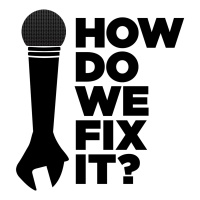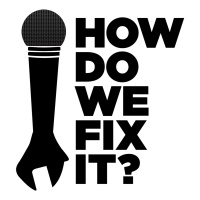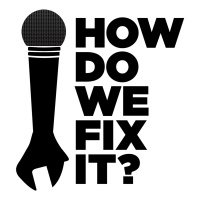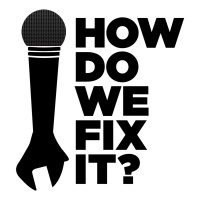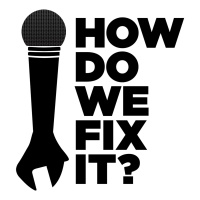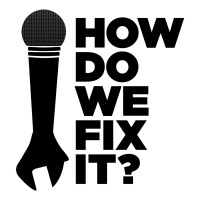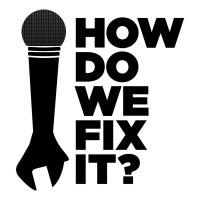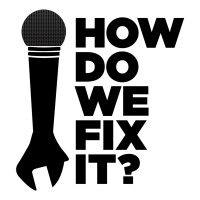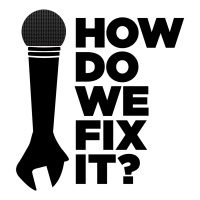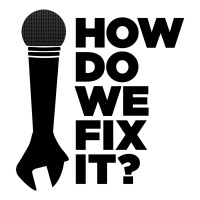How Do We Fix It?
- Autor: Vários
- Narrador: Vários
- Editor: Podcast
- Duración: 182:12:02
- Mas informaciones
Informações:
Sinopsis
From politics to the personal, we're about solutions. Our weekly podcast features two friends and longtime journalists. Join Richard Davies (ABC News) and Jim Meigs (Popular Mechanics) as they challenge authors, experts and provocateurs in a search for positive, practical ideas. Guests include Alan Dershowitz, a noted legal scholar and defender of civil liberties; Mike Rowe of "Dirty Jobs" and Lenore Skenazy, founder of "Free Range Kids." Topics include politics, parenting, personal finance, human behavior and much more. "How Do We Fix It?" - a repair manual for the real world. Produced by DaviesContent
Episodios
-
The Collapse of Local News and How to Rebuild Regional Journalism: Anna Brugman
19/04/2024 Duración: 23minIn much of the country local news has collapsed, threatening civic pride and a sense of community for countless towns and cities. This dramatic change has also deepened America's divides.As our guest, journalist and public policy researcher Anna Brugmann explains in this episode, "the internet disrupted the local journalism model". Newspaper advertising revenue fell 80% since 2000. Thousands of local and regional publications closed. Most surviving newsrooms faced drastic cutbacks. Coverage of all kinds of local events— from city hall, school board meetings and football games to local businesses and zoning decisions — disappeared.First, Craigslist displaced print-based classified ads. Then Google, Facebook and other online firms became the main source of consumer advertising. We discuss the impact on local journalism. In recent decades, the news we read and listen to has largely shifted from local reporting to often highly polarizing national opinion journalism.In
-
Diversity Is Great. DEI Isn't. Amna Khalid and Jeff Snyder
22/03/2024 Duración: 35minDiversity equity and inclusion: Sounds like a good thing in an incredibly diverse country such as ours, especially when teaching young people at American colleges and universities.But the DEI industry - or DEI Inc. — has arguably gone off the rails. There’s a big difference between the intentions behind a lot of diversity training and the results. We learn about the crucial difference between training and education, and hear the case against the Stop WOKE Act in Florida.History professors Amna Khalid and Jeff Snyder share their deep concerns about a growing industry. There is no reliable evidence that diversity, equity and inclusion training sessions at colleges, non-profits, and large corporations actually work. In many places, DEI could be making things worse, imposing an ideological litmus test and encouraging cynicism and dishonesty at places of learning.Amna specializes in modern South Asian history, the history of medicine and the glo
-
Politics: Majority In The Middle. Shannon Watson
08/03/2024 Duración: 29minNews coverage of Super Tuesday and other party primaries focused mainly on base voters— Democrats and Republicans. But most Americans are actually on the political sidelines or somewhere in the middle. Many have a mix of conservative and liberal views.This episode is about them. Our guest is Shannon Watson, the Founder and Executive Director of Majority in the Middle. Her Minnesota-based non-profit group works to give voters and elected officials a place to gather outside the extremes. "We try to elevate the people who are demonstrating the behavior we want to see", Shannon tells us. "When it's only the rabble-rousers who get the coverage then there is an incentive to be one of them." Majority in the Middle also promotes structural changes in governing that will remove barriers to cooperation across the political aisle. While the two parties have a stranglehold on many aspects of elections and governance, record numbers of Americans no longer registe
-
Changing Journalism: Boosting Trust in the News Media. Joy Mayer
09/02/2024 Duración: 26minOnly four-in-ten Americans say they have a lot of trust in the news media. That's a big problem for our democracy, especially in this volatile presidential election year. While journalists are supposed to tell the truth and get the story right, just 35% of right-of-center voters have some trust in what they see on the news.Democrats and independents are much more likely to trust journalists, but Americans of almost all shades of opinion are skeptical of the journalists, not only questioning the quality of their work but the intentions behind it.Our guest is Joy Mayer, Director of the non-profit group, Trusting News, which has partnered with many local newsrooms around the country to help journalists earn consumers' trust.While many reporters, writers and editors are reluctant to discuss their politics, most journalists have liberal or progressive views. "I think it's something we need to talk about more openly," Joy tells us.In this episode, we look at bias, transp
-
Ideas For Everyone: The Virtues of a Liberal Education. Roosevelt Montás
26/01/2024 Duración: 30minWhat is the point of a good education? Do we need it to learn a narrow set of skills ro help us get ahead in the workplace, or should knowledge and learning to be used over a lifetime to acquire wisdom that enables us to think more deeply about our place in the world?This question has profound resonance at a time of angry divides over American politics and moral confusion at elite American universities. The President of Harvard, Claudine Gay, resigned after months of campus unrest and controversy. In December, Gay and two other university presidents faced widespread criticism for their testimony at Congressional hearings about antisemitism on their campuses.In this episode, we hear from an university educator who makes the case for liberal education that gives students the tools needed to have a deeper sense of purpose. Roosevelt Montás is the author of "Rescuing Socrates: How The Great Books Changed My Li
-
What Could Go Right? 2024 Predictions Show
12/01/2024 Duración: 26minFrom the economy and prospects for a Biden vs Trump rematch to the future for global energy and artificial intelligence, Richard and Jim make their forecasts for 2024. And we re-visit our predictions from exactly a year ago and report on precisely how we did. "It's sort of like weather forecasters and opinion pollsters going back and owning up to their mistakes," says Richard. "I mean, who often do we see that!"Once again, Meigs and Davies make their best guesses about what's to come this year. Will Donald Trump maintain his slim lead in the polls over President Biden? Is there a much higher risk than most experts expect for energy supplies during the winter months? How big are the chances for a wider war in the Middle East?Fresh off his A+ forecast on the 2023 economy, when Richard out-forecasted the overwhelming majority of experts, we'll get more predictions about this year. Don't make any more investments without hearing this episode!Jim, who writes with perception and foresight about nuclear po
-
How to Escape The Identity Trap - Yascha Mounk (part two)
29/12/2023 Duración: 31minWe continue our discussion with Yascha Mounk, one of the leading public intellectuals of our time. The subject is a hugely influential ideology that attempts to put racial, sexual and gender identity at the center of our social, cultural and political life. The "identity synthesis", Mounk argues, denies that members of different groups can truly understand one another and this stifles public discourse.In this podcast episode, we learn why an obsession with identity undermines social justice, fuels culture wars, and boosts hateful hardliners on the right and left— from Donald Trump to protesters who support Hamas and its murderous attacks on Israeli civilians. We also hear how to politely but firmly push back against those who have become ensnared in "The Identity Trap," the name of Yascha Mounk's new book."Categories like race and gender and sexual orientation help to explain what's going on in the world, but they're not the only categories that help to explain it," Mounk tells us. "There'
-
The Origins of Today's Identity Politics - Yascha Mounk (part one)
15/12/2023 Duración: 31minHaving skewered right-wing populism and its demagogues in his two previous best-selling books, politics professor, writer, and podcaster Yasha Mounk turns now to the threat posed to liberalism from those progressives who champion "woke" identity politics. We discuss his latest, "The Identity Trap: A Story of Ideas and Power In Our Time."This episode— the first of two with Yasha Mounk — looks at the complex roots of a highly influential ideology based on personal identity— specifically race, gender and sexual orientation. These are said to determine a person's power, role in society, and how they see themselves. Mounk explains how the identity synthesis, which has become widely accepted in many universities, nonprofits and large corporations, had its origins in several intellectual traditions, including post-colonialism, postmodernism and critical race theory.Our interview mentions ideas and concepts raised by Michel Foucault, Derrick Bell, Kimberlé Krenshaw, Edward
-
Imaging a Better Future. How Doomers Prevent Progress. James Pethokoukis
01/12/2023 Duración: 36minYes, it's our 400th episode. But instead of looking back over the past eight-and-a-half years of our podcasts, we consider the future: How collective optimism or pessimism can have a huge impact on the economy, risk taking, and the acceptance of new technologies that spark growth and innovation.Our guest is scholar and journalist James Pethokoukis of the American Enterprise Institute, author of "The Conservative Futurist: How To Create the Sci-Fi World We Were Promised."In this episode he argues that in the decades after World War Two and during the space race, America was the world's dream factory. TV and movies helped to turn imagination into reality, from curing polio to landing on the Moon to creating the internet. In those years we were confident that more wonders lay just over the horizon: clean and infinite energy, a cure for cancer, computers and robots as humanity’s great helpers. But as we moved into the late 20th century, we grew cautious, even cynical,
-
Polarization Series: Bridging Divides at Braver Angels. Erica Manuel and Manu Meel
17/11/2023 Duración: 30minAffective polarization in America – the gap between voters' positive feelings about their own political party or "side" and negative feelings toward the opposing party – has sharply increased during the past two decades.We speak with two leaders in local government and a nationwide students group about effective ways to bridge divides. Erica Manuel is CEO and Executive Director at the Institute for Local Government in Roseville, California. She has over 20 years of experience helping public, private and nonprofit organizations implement innovative policies to provide strong leadership, advance climate resilience, support economic development, engage communities, and drive positive change.Manu Meel is CEO of BridgeUSA, a student-led nonprofit organization that creates spaces at colleges and high schools for open discussion among students about political issues. BridgeUSA began in 2016 at the universities of Notre Dame, CU-Boulder and UC Berkeley in response to growing po
-
Polarization Series: The Soul of Civility. Alexandra Hudson
03/11/2023 Duración: 28minIt's easy to look at the impacts of rigid polarization and blame our leaders and political parties, the media, or the education system. In this episode, we hear an argument that the first thing all of us should do is focus on what we can control: ourselves. We discuss how to learn to live with others despite deep divisions. All democracies need protests and debates to flourish. But we also need to respect ourselves and acknowledge the dignity of others.Alexandra Hudson is the author of the new book, "The Soul of Civility", and an adjunct professor in philanthropy at Indiana University. She argues that civility is a key solution for polarization and a breakdown in social order. In her writing she examines how civility—a respect for the humanity of others—transcends political disagreements. Civility, she writes, is not a technique, but a disposition: "a way of seeing others as beings endowed with dignity and inherently valuable."The divided state of the world "is a t
-
Polarization Series: The Keys to Good Conflict. Hélène Biandudi Hofer
20/10/2023 Duración: 28minDestructive conflict aims to destroy the other side. But constructive conflict can be a force for good.In this episode we learn how good conflict helps move people beyond polarization, slogans, and angry tweets to a place where they can connect and grow— even as they strongly disagree. Hélène Biandudi Hofer says that when we have the vocabulary and basic skills to investigate conflict with curiosity, it can change everything.Journalists Hélène Biandudi Hofer and Amanda Ripley co-founded Good Conflict, which works with news organizations, non-profits, elected officials, educators, religious leaders, and others to lean into conflict in a constructive, productive way. Hélène developed and managed the Solutions Journalism Network’s Complicating the Narratives project. She trained more than a thousand journalists across 125 newsrooms throughout the world."I believe story is the most underutilized and under-appreciated thing to help people understand those we disagree with an
-
Polarization Series: Is Social Media to Blame? Professor Chris Bail
06/10/2023 Duración: 34minAlmost everyone has an opinion about the impact of social media on political polarization. Most of us believe that Twitter, Facebook, Reddit, YouTube and other sites have made our civic life more angry and divided. But how much of this is true? Are consumers as much to blame as the platforms themselves?15 years ago, in the very early days of social media, many Americans had a much more positive view of this new technology. It was bringing friends and families together, opening up new sources of information, and that was viewed as a good thing.We discuss the surprising findings of research into social media and polarization with Professor Chris Bail, founder of the Polarization Lab at Duke University. He’s the author of the 2021 book, “Breaking The Social Media Prism.” Bail studies political tribalism, extremism, and social psychology using data from social media and research from computational social science.This show was recorded during a week
-
Polarization: My Side Is Wrong. Jim & Richard
22/09/2023 Duración: 26minHave you ever been asked by a political opponent to describe what's wrong or weak about your own side's arguments? That's what Richard and Jim do here. This episode could have been ripped from a Braver Angels training seminar, but to our knowledge, no other podcast has tried this before.Liberal-leaning Richard takes on three hot topics, picked by Jim, where the left is wrong. Jim does the same thing for his side, discussing three examples picked by Richard.The ground rules are simple: No "your-side-ism". When describing the failings of their own side neither host was allowed to criticize their opponents. If they do, a loud bell rings. Listen to find out how many times the darn thing goes off!The six topics are: - Liberals try to do too much and as a result their policies backfire. - Conservatives fail to challenge populism, Donald Trump, and stand up for democracy. - The left hugely underestimates the cost of their spending programs. - The right ignores the hu
-
Polarization: Is America Too Fragmented? Rick Pildes and Lee Drutman
08/09/2023 Duración: 30minWhy is American politics so dysfunctional? Is it because we are too polarized or too fragmented? Throughout this fall we will be exploring different aspects of polarization— arguably the most important threat to both effective governance and a stable democracy. This episode includes an edited recording of a lively conversation from the podcast, "Politics In Question", between Rick Pildes, Professor of Constitutional Law at NYU School of Law, and political scientist Lee Drutman, a senior research fellow at the New America Foundation.Lee has been a guest on several previous episodes of "How Do We Fix It?". Author of the book, "Breaking the Two Party Doomloop: The Case for Multiparty Democracy in America", Lee is known as an advocate for proportional representation with ranked-choice voting, arguing that it would reduce political polarization and minimize the risks of democratic backsliding. Rick is skeptical of this analysis, and argues that "the most perva
-
American Polarization: Political and Personal. Mónica Guzmán
25/08/2023 Duración: 29minToxic polarization is "the problem that eats all other problems... It's the sludge at the base of everything else," our guest Mónica Guzmán tells us. In this really useful repeat episode from 2022, we learn how to fight back against the confusion and heartbreak of living with rigid divides.This show is a curtain raiser for a series we are doing this fall with funding from Solutions Journalism Network. We will be examining threats to our society from polarization and recent efforts to build a national movement to bridge divides.Monica is a bridge builder and author of the highly-praised book "I Never Thought Of It That Way: How to Have Fearlessly Curious Conversations in Dangerously Divided Times". She serves as a Senior Fellow for Public Practice at the national depolarization organization, Braver Angels.This interview contains surprises. One of them, says Monica, is that "the anger and the rage that we see out there that defines our division doesn't actually
-
A Bigger Tent for Democrats: Lanae Erickson
11/08/2023 Duración: 27minWhy aren’t Democrats doing much better in elections for Congress and also in state races? We explore several reasons. One is that Democrats have been losing the support of many black, white and hispanic working class voters. We heard a forceful argument about that in "How Do We Fix It?" episode #389 with Ruy Teixeira.In this show we expand the argument and look at another group of voters often ignored by Democratic party leaders— Christians and especially Catholics who are among the largest group of swing voters. This is a shared podcast with "Talkin' Politics and Religion Without Killin' Each Other". Their show and ours are members of the Democracy Group podcast network, Our guest is Lanae Erickson, Senior Vice President at Third Way, a center-left think tank that champions pragmatic liberal ideas. She spoke earlier this year with Talkin' Politics and Religion's host, Corey Nathan. Thank you, Corey, for giving us permission to share an edited version of a rich and
-
The Fight to Save the Town: Michelle Wilde Anderson
28/07/2023 Duración: 37minGlobalization, technology, devastating impacts from the foreclosure crisis and the opioid addiction have wreaked havoc on communities left behind by the modern economy. Some of these discarded places are rural. Others are cities or suburbs. Some vote blue, others red. Some are the most diverse communities in America, while others are nearly all white, all Latino, or all Black. In this episode we visit four cities and towns with deep poverty and gutted public services— where entire communities are struggling to hold on.Our guest is Michelle Wilde Anderson, a professor of property, local government and environmental justice at Stanford Law School. Her recent book is "The Fight to Save the Town: Reimagining Discarded America"."We have given up on many of these places", Michelle tells us. She describes discarded America as "giant parts of many states that have not found their foothold in the 21st century economy." Discarded America is "a term that describes active decision making."Her book des
-
For the Love of Cities. Peter Kageyama
14/07/2023 Duración: 26minWhy do we connect emotionally with some places and not others? Why does that matter? What does loving the place you live in have to do with healing the partisan divide? We explore these questions and hear about solutions from author, researcher and speaker Peter Kageyama.This shared episode is an edited version of a podcast released earlier this year by "Village Squarecast". Our show includes extracts from a speech delivered at a special meeting of The Village Square in Tallahassee, Florida.Peter Kageyama is the author of For the Love of Cities: The Love Affair Between People and Their Places, the follow up, Love Where You Live: Creating Emotionally Engaging Places and his latest, The Emotional Infrastructure of Places. He loves cities and is the former President of Creative Tampa Bay, a grassroots community change organization and the co-founder of the Creative Cities Summit, an interdisciplinary conference that brings citizens and practitioners together around the big idea of ‘the city.’
-
Where Have All The Democrats Gone? Ruy Teixeira
30/06/2023 Duración: 32minAmerican politics are evenly divided between Democrats and Republicans. But our guest argues that it doesn't have to be this way. He tells fellow Democrats: "Given the problems the Republicans have, why aren't you beating the hell out of these people?"Political scientist and author Ruy Teixeira says that recent election results have been a lost opportunity as the left pursued identity politics instead of focusing on class. While more white college-educated voters have abandoned the Republicans in the past decade, Democrats have lost ground among white and hispanic working class voters. "That's a fundamental question that Democrats should be confronting, but don't," he tells us.Ruy Teixeira is among America's best-known political thinkers. He's a senior fellow at The American Enterprise Institute, where he writes and does research about changing party coalitions and the future of electoral politics. He calls himself a social democrat.He is co-author with John Judis of "T

